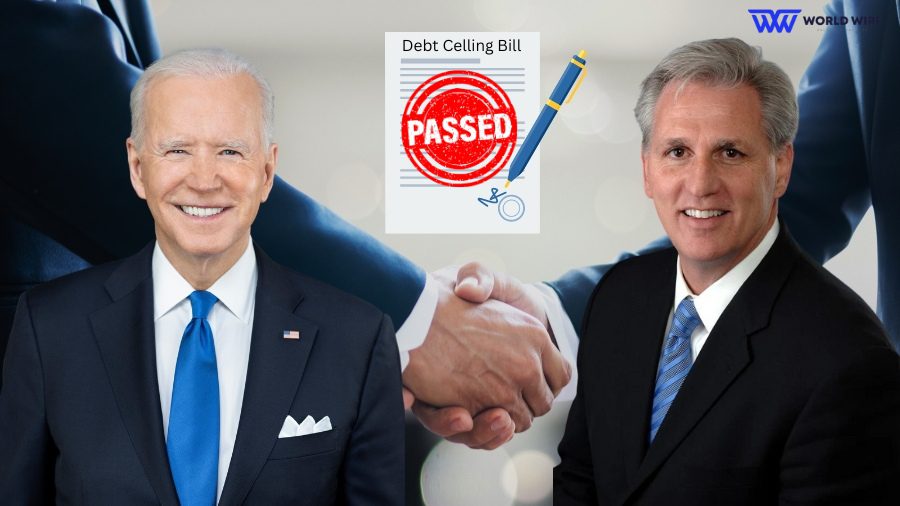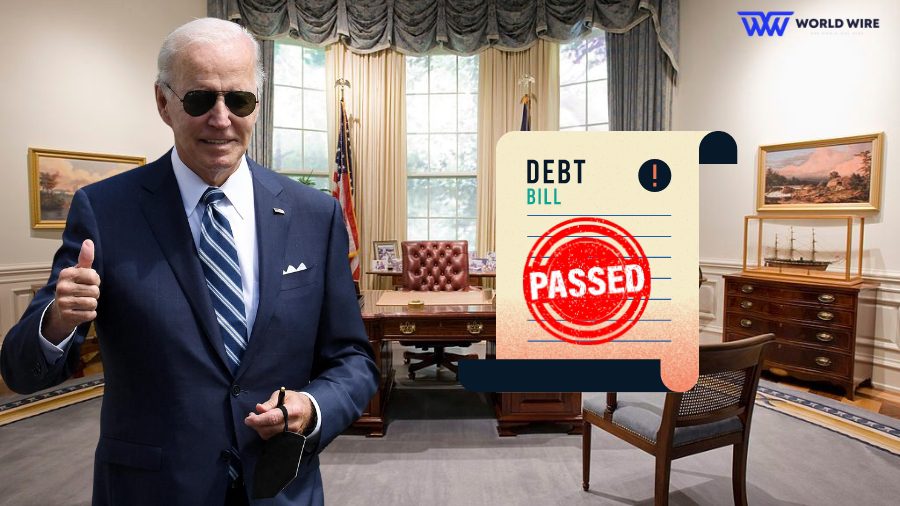The long-negotiated debt ceiling bill successfully cleared its major hurdle to become law when the Senate voted to approve it last night.
Now, the bill has reached the President’s desk for approval, the last step required to turn the bill into a statute.
Let’s analyze the news and read how one of the most controversial bills was able to reach its destination before the deadline for the country’s default.
Senate Passes Bipartisan Debt Ceiling Bill, Heads To Biden’s Desk
On Thursday, the United States Senate voted to approve a bipartisan debt ceiling bill to increase the country’s borrowing. Now, the bill has moved to President Joe Biden to be signed into law under Fiscal Responsibility Act.
The bipartisan debt ceiling bill proposes to keep non-defense spending roughly flat in the 2024 fiscal year, increase it by 1% the following year, and suspend the debt limit until January 2025, past the 2024 presidential election.
As per the information from the Congressional Budget Office, the bill also includes around $1.5 trillion in spending cuts with provisions to add new work requirements for SNAP recipients.
The bill was passed by a vote of 63-36, with 17 Republicans and 46 Democrats voting for it to prevent the U.S. default by June 5. In contrast, four Democrats, 31 Republicans, and one independent member, Senator Bernie Sanders of Vermont, voted “no” against the bill.

The House of Representatives approved the bill on Wednesday with a bipartisan vote of 314-117 after much opposition to several compromises the house speaker, Kevin McCarthy, and President Biden had made in the final legislation.
Also, See: Joe Biden to Meet with Kevin McCarthy in Debt Ceiling Talks
Many economists had asserted that the country could face a money crisis to be able to pay its bills by June 5. After the deadline, the country cannot enact the Fiscal Responsibility Act to extend the government’s borrowing through 2024 while reducing federal spending.
Though the bill faced huge criticism from both Republican and Democrat senators, it has managed to become a law. Nonetheless, many senators like Mike Lee are still unsatisfied with the McCarthy-Biden agreement.
Senator Bernie Sanders explained why he couldn’t “in good conscience” vote for the bill even when the nation could default. He Tweeted, “Deficit reduction cannot be about cutting programs that working families, the children, the elderly, the sick, and the low-income depend upon.
It must be about demanding that the billionaires and profitable firms pay their fair share of taxes, reducing the price of prescription drugs, and ending billions of dollars in the corporate world that goes to the fossil fuel industry and other corporate interests.”
Some Republican party members raised concerns over Pentagon funding levels, claiming them to be too low, while the Left disagreed with the new work requirements for older American citizens in the food assistance program, modification of the National Environmental Policy Act, and approval of the Mountain Valley Pipeline natural gas project.
At the same time, some senators also appreciated the passage of the debt ceiling agreement. Senate Majority Leader Chuck Schumer posted on Twitter, “I support this bipartisan agreement. Nobody is getting all they want, but it takes default off the table and protects key investments we have made.”
Nonetheless, both political parties finally agreed and achieved successful results with the bill. Republicans succeeded in many policies and limited government spending, while Democrats legislated on health care, clean energy, infrastructure, etc.
Apart from what the Senators say, President Biden is pleased with the debt ceiling agreement and noted on Twitter on Thursday,” Thanks to good faith negotiations, we reached a bipartisan budget agreement that protects our historic economic progress and prevents a first-ever default.”
Also, See: Biden 2024 Campaign Announcement is Probably Coming Next Week
With the President expected to sign the newly passed bill, a deal enabling the U.S. government to borrow more funds is on its way to becoming law, a few days before the world’s largest economy is due to begin defaulting on its debt.







Add Comment